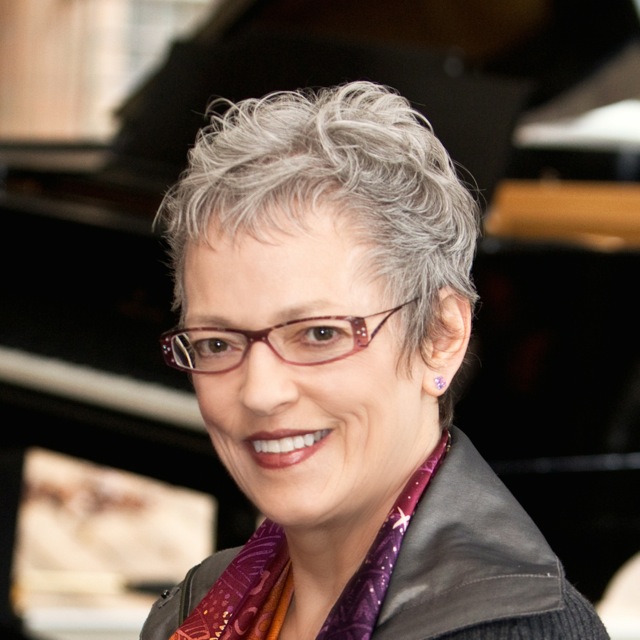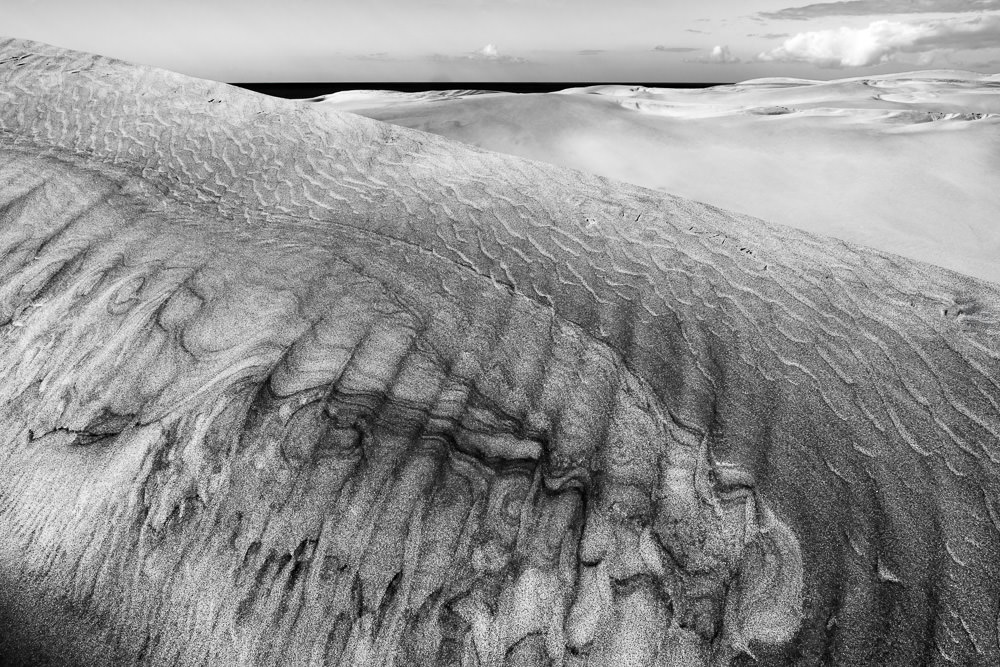cindy mctee
narrative biography
Cindy McTee was born in 1953 in Tacoma, Washington, and raised in the nearby town of Eatonville. The daughter of musical parents (her father played trumpet, and her mother played clarinet and saxophone), McTee often went to rehearsals of their small dance band where she heard popular music and jazz from the 1940s and 1950s. McTee began piano lessons at the age of six with a teacher who encouraged improvisation (the beginnings of her career as a composer), and she took saxophone lessons from her mother a few years later.
Another important influence on her musical life was the eminent Polish composer Krzysztof Penderecki, whom she met in 1974 while majoring in composition at Pacific Lutheran University in Tacoma. Penderecki invited McTee to teach his children English in exchange for composition lessons. She accepted the invitation and spent a year in Poland living with the Penderecki family while studying orchestration, twentieth-century composition techniques, and counterpoint at the Cracow Academy of Music. Lessons with Penderecki were conducted informally, generally at the family dining room table. She also studied with Marek Stachowski and Krystyna Moszumanska-Nazar.
McTee studied with David Robbins and Thomas Clark at Pacific Lutheran University (BM 1975), Jacob Druckman and Bruce MacCombie at the Yale School of Music (MM 1978), and Richard Hervig at the University of Iowa (PhD 1981).
McTee taught for three years at her undergraduate alma mater in Tacoma, Washington, and in 1984 joined the faculty of the University of North Texas, receiving promotions to Full Professor in 1995 and Regents Professor in 2000. In 2009, she was designated a Fellow in UNT's Institute for the Advancement of the Arts. She also participated in leadership roles at UNT, most notably as Chair of the Division of Composition Studies for five years ending in 2000.
In May 2011, she retired from the University of North Texas as Regents Professor Emerita, and in November 2011, she married conductor Leonard Slatkin. Their primary residence is in Saint Louis, Missouri.
McTee has received numerous awards for her music, most notably a Guggenheim Fellowship, a Fulbright Fellowship, a Composers Fellowship from the National Endowment for the Arts, two awards from the American Academy of Arts and Letters, a Music Alive Award from Meet the Composer and the League of American Orchestras, the Detroit Symphony Orchestra's third annual Elaine Lebenbom Memorial Award, and a BMI Student Composers Award. She also won the 2001 Louisville Orchestra Composition Competition.
She has been commissioned by the Detroit Symphony Orchestra (2009-10), Leonard Slatkin, music director; the Houston Symphony Orchestra (2007), Hans Graf, music director; wind ensemble consortia (2007, 2001); the Amarillo Symphony Orchestra (2006), James Setapen, music director; the Dallas Symphony Orchestra (2005 and 2000), Andrew Litton, music director; Bands of America (2004), Eugene Migliaro Corporon, conductor; the National Symphony Orchestra (2002), Leonard Slatkin, music director; the Big Eight Band Directors Association (1995); the American Guild of Organists (1993); the Barlow Endowment (1993); the College Band Directors National Association, Western and Northwestern Divisions (1993); and the Pi Kappa Lambda Board of Regents (1991).
Hailed by the Houston Chronicle as a composer whose music reflects a “charging, churning celebration of the musical and cultural energy of modern-day America,” McTee “brings to the world of concert music a fresh and imaginative voice.”
The Washington Post likewise characterized her work as “unmistakably American-sounding, [composed with] … craftsmanship and a catholic array of influences across several centuries.” “There’s also a polished gleam about her colors,” according to the Detroit Free Press, as well as “an inventive approach to form and a respect for tradition.”
The works of Cindy McTee have been performed by leading ensembles in major venues around the world, including Carnegie Hall on five separate occasions. Among the many ensembles that have played her music are the Baltimore, Bern, Boston, Chicago, Dallas, Detroit, Finnish Radio, National, NHK (Tokyo), Pittsburgh, RTÉ National (Dublin), RTVE (Madrid), Shanghai, Sidney, St. Louis, Tokyo Metropolitan, and Toronto symphony orchestras; Buffalo and London philharmonic orchestras; Cleveland, Louisville, and Philadelphia orchestras; Houston and Seattle symphonies; Lone Star Wind Orchestra; Los Angeles, Moscow, and New York philharmonics; Orchestre National de Lyon; and United States Marine, Army Field, Coast Guard, and Navy bands.
In A Composer's Insight: Thoughts, Analysis and Commentary on Contemporary Masterpieces for Wind Band (Timothy Salzman, editor), David Fullmer wrote:
A description of McTee’s compositional style would include humor; expectation denied; unexpected silences and rhythmic displacement; jazz textures; post minimalism. She believes, as Stravinsky, that music either sings or it dances. She characterizes her music as intentionally playful and humorous.
As far as specific musical influences are concerned, I can say that my current interest in expressing humor through music may be attributable to Penderecki. When thinking of Penderecki's music, most people probably recall Threnody, the St. Luke Passion, the Dies Irae and other solemn works. However, there are also several capriccios and a comic opera. I think Penderecki may have given me the courage to break away from the notion that modern music need always express serious modes of thinking and feeling.
Structurally her music embraces traditional forms that are unified through unrelenting chains of ostinati which, via clever asymmetrical variations, run counter to predictable strong beat/weak beat relationships. Those variations in typical accent structures draw the listener into a deeper mode of concentration, as one is never sure where the next rhythmic displacement will occur.
There is a pervasive jazz influence in her music rhythmically, harmonically and melodically. Her technically complex melodic fragments comprised of a step-wise chromaticism as well as disjunct leaps are clearly references to the be-bop jazz era. Rhythmically, many of those melodic fragments conclude on an offbeat and are frequently broken up by brief, syncopated tutti statements. Driving bass lines, snare drum rim shots and the use of ride cymbal and hi-hat percussive effects are also hallmarks of her composition's jazz textures.Cindy's extramusical activities have included mountain climbing, hiking, downhill skiing, amateur car racing, ballroom dancing, language study, and photography.
Of photography, she has written:
I am a professional composer, retired professor of music, and hobbyist photographer. Together with my husband, an orchestral conductor, I now travel the world, drawing inspiration from both natural and urban environments.
The similarities between music and photography become ever more apparent to me as I gain experience using my eyes as if they were my ears—seeing textures, lines, and shapes as intently as I hear them. I have discovered that multilayered landscapes often appear to be contrapuntal, like a Bach fugue; cameras and lenses can be “played” as artfully as musical instruments; and visual patterns have rhythm, too.
Musicians focus on the color of sound, its clarity, and its brightness. Photographers describe light in the same terms.
Both composers and photographers give much thought to matters of balance, repetition, contrast, and emotion. It has also been revelatory to witness how a photo “resonates” with a kind of silent music or mood, just as music conjures up images to tell its story.
There are also technological parallels. For example, a macro lens can be considered analogous to a microphone, both providing opportunities to see or hear beyond the realm of normal experience to a magical place of abstraction and wonder.
The two media, of course, also differ, perhaps most significantly in their relationships with time; one captures a single instant, and the other requires minutes or hours to convey its messages. Maybe it's that ability to freeze time through photography that most appeals to me, something impossible to achieve in music. How often have I wanted to hold on to that breathtaking musical moment—but no—it disappears in advance of the next musical “frame.”
(Updated 4.10.25)

